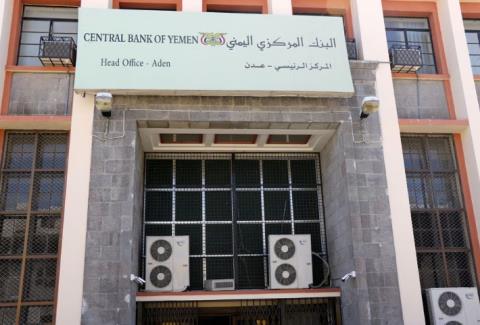
The "sudden decline" in the Yemeni rial on Wednesday, slowed down following the announcement of the Saudi deposit of two billion dollars. As soon as the announcement was made, price of the Yemeni currency rial jumped about 15 percent against the US dollar, several bankers told Asharq Al-Awsat.
Most of the exchange and money transfer companies in Sanaa resumed their business. Ibrahim, an employee at a famous exchange company in the center of Sanaa, said that following the announcement of the Saudi deposit, the deterioration of the riyal exchange rate declined significantly.
Asharq Al-Awsat toured a number of exchange companies to ask about the exchange rate and the workers confirmed that the price of the dollar fell to 460 riyals, after it had reached 530 riyals on Wednesday.
The legitimate government stated the reason currency collapsed to this level was due to Houthis economic policies and their looting of the central bank reserves of hard currency, amounting to about $5 billion, plus two trillion Yemeni rial.
President Abed Rabbo Mansour Hadi ordered the transfer of the central bank to the interim capital of Aden in September 2016, but it was too late, according to specialists in Yemeni affairs, as the militias took the reserves to fund their wars during the two years of the coup.
The collapse of the Yemeni rial to more than 120 percent during the three years of the coup could have caused a humanitarian catastrophe in terms of rising commodity prices and the inability of millions of poor families to provide for themselves.
About one million government employees have not received their salaries in Sanaa and other areas controlled by Houthis for at least 16 months.
Meanwhile, President Abd-Rabbu Mansour Hadi sent a cable of thanks to the King of Saudi Arabia the Custodian of the Two Holy Mosques Salman bin Abdulaziz for the urgent economic support to Yemen including a deposit of $2 billion to support Yemens currency.
In his cable, Hadi appreciated King Salmans directives "to support the Yemeni Riyal" and the Kingdoms eagerness to supply the means of stability to Yemen.
Yemens Cabinet held a meeting in Aden on Wednesday on the brotherly Saudi bailout to stabilize the countrys currency, according to Saba news.
"In the name of the Cabinet, I highly appreciate the orders of King Salman bin Abdulaziz Al Saud to deposit $2 billion into the Central Bank in order to lift the suffering of the Yemeni people," said Prime Minister Ahmed bin-Daghr at the opening of the cabinets meeting.
The cabinet said "this generous support comes at a time we are facing complicated economic circumstances as a result of the war ignited by Irans proxies and tools in Yemen – the Houthi rebel militia."
The government reiterated the importance of establishing a clear partnership mechanism between the traders, businessmen, bank, and exchange companies. It added that the central bank and relevant institutions should take responsibility and activate funds control.
The Central Bank of Yemen said that it received confirmation that the Saudi government had deposited $2 billion in its foreign accounts, hours after the directives by King Salman.
Monasser al-Quaiti, governor of the bank, said the central bank will move towards strengthening the commercial banks to manage their domestic and foreign banking operations from their headquarters in Aden in addition to regulate and control the foreign exchange market.
Quaiti stated that the Saudi deposit would "create real opportunities to meet the obligations arising from foreign exchange as a result of commercial transactions between the local and foreign economies to cover the living needs of Yemen. It will also implement government programs aiming at providing the local market needs of basic goods and services."
Over the past two days, the price commodities in various parts of Yemen increased, which was accompanied by the collapse of the local currency. Traders in Houthi controlled areas also refused to trade with the rial and conditioned using the dollar or its equivalent of foreign currencies.
Yemeni economists believed recent Saudi deposit will help stabilize the currency in the near term, but they asserted that saving the economic situation completely requires governmental measures to improve the countrys revenues by resuming export of gas and oil in its areas of control and terminating the Houthi coup.










